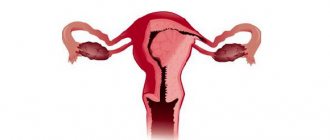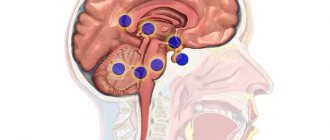What menstruation is considered heavy?
It is considered normal for menstruation to occur after a period of 21-35 days, and for each individual woman they occur after approximately the same number of days (for example, after 25-28). Their duration should not be less than 2 days and more than 1 week. And the volume of blood released during the entire menstruation is not less than 40 ml, not more than 150 ml (the normal average value is 80 ml).
Menstruation is considered heavy if more than 150 ml of blood is released. For convenience, women usually focus not on the volume of discharge, but on the number of pads per day. If everything is fine with your periods, then you need about 4 pads a day.
When menorrhagia is not a pathology
Heavy periods (menorrhagia) are not a symptom of the disease in the following cases:
- If there is a genetic predisposition in which menstruation is abundant throughout the entire reproductive period, there are no severe side symptoms, the woman is healthy.
- Menorrhagia can occur in girls at the very beginning of puberty, when the cycle has not yet established itself (during the first 2 years). The reason is fluctuations in the ratio of sex hormones produced in the ovaries.
- The intensity of menstruation deviates from the norm during perimenopause, with heavy menstruation alternating with scanty menstruation.
Symptoms of pathological heavy menstruation
Depending on the type of pathology, the blood may be bright scarlet or contain blood clots. It is necessary to change the pads every 1-1.5 hours. Associated symptoms include:
There are two types of menorrhagia: primary (during the first menstruation in adolescents) and secondary (occurring in adulthood).
Types of uterine bleeding
Bleeding in gynecology is divided into two types, which are abnormal in nature - these are ovulatory and anovulatory periods. The first discharge is very scanty and has a short period of duration, while the second has the opposite picture with a long duration and excessive abundance, as well as poor health. They, in turn, are divided into several types:
- prolonged heavy bleeding (menorrhagia). The reason for this is other diseases of the endocrine and reproductive systems, poor nutrition or deformation of the uterus. Depending on the causes, treatment may vary;
- Bleeding that occurs suddenly between menstruation (metrorrhagia). They occur during inflammatory diseases or organic lesions and do not depend on the day of the cycle. They are in turn divided by age categories: menopausal discharge, which occurs during menopause. They are not dangerous unless they are intense;
- and juvenile discharge, which is characteristic of teenagers. They are associated with a not yet fully formed reproductive system;
Apply a short cold compress
A doctor can prescribe the correct treatment, but some recommendations should be followed before the visit. You need to get plenty of rest, avoid strenuous exercise, and drink more water. It is prohibited to visit baths and saunas and drink alcohol. And to stop possible uterine bleeding, you should apply a cold heating pad or a bottle of water to the lower abdomen. But no more than 10-15 minutes, as inflammation can develop!
Take care of yourself and be healthy!
Causes of heavy periods
In addition to the mentioned natural causes, there are also pathological ones associated with serious diseases.
Hormonal disbalance
Throughout a woman’s life, the natural hormonal levels change many times. In adolescence, during puberty, during pregnancy, after childbirth, during menopause, all physiological processes are associated with sex hormones. The natural ratio is disrupted if a woman has endocrine diseases (deviations in the functioning of the pancreas and thyroid glands, adrenal glands, pituitary gland).
The cause of deviations from the norm may be the use of hormonal contraceptives or treatment, for example, of certain pathologies in the mammary glands with the help of hormones. In this case, the woman’s menstrual cycle is disrupted, painful and heavy periods appear.
Diseases of the uterus and ovaries
Uterine fibroids are benign growths in the muscles of the uterus, both outside and inside it. They change the structure of the endometrium (inner mucous membrane). When it is rejected, causing the appearance of menstruation, a large number of vessels are injured, which is the reason for the increase in the intensity of bleeding.
Polyps. They can occur both in the uterine cavity and in the cervix. They grow from endometrial cells. They are a benign neoplasm in the form of a tubercle filled with blood. It is connected to the surface of the uterus by a thin stalk. Polyps reach several centimeters in diameter. They are easily injured and bleed. There may be several of them. Menstruation is accompanied by heavy bleeding. If such polyps are not removed, they can degenerate into cancer. Heavy periods are in this case an important symptom, warning of the need for a serious examination.
Adenomyosis of the uterus. It happens that the mucous membrane grows into the wall of the uterus located underneath it. Sometimes this pathology is even congenital. It mainly appears in women around 30 years of age. The reason is the same hormonal imbalance or trauma to the uterus during childbirth, abortion, or curettage. If such a disease is associated with hormonal abnormalities, then, as a rule, when menopause occurs, it goes away on its own. A concomitant pathology is endometriosis, in which the uterine epithelium grows into the tubes, ovaries, vagina, and peritoneum. Detachment of the endometrium is painful and is accompanied by copious blood loss.
Ovarian dysfunction. This is a disruption of the ovaries, insufficient production of sex hormones, estrogens and progesterone. The functioning of the ovaries depends on the condition of the pituitary gland, where hormones such as prolactin, luteinizing hormone (LH), and follicle-stimulating hormone (FSH) are formed. If production does not correspond to the norm (for example, with age-related changes during menopause or with a tumor of the pituitary gland), then the woman experiences various abnormalities in the menstrual cycle. Menstruation comes sometimes with a short, sometimes with a long break. The discharge is scanty and frequent or copious and prolonged (lasting more than 10 days). In this case, there is no ovulation, that is, a mature egg cannot leave the protective capsule (follicle); accordingly, the woman cannot become pregnant, since fertilization of the egg is impossible.
With this disease, the symptoms of premenstrual syndrome usually worsen: headaches, tearful mood. Menstruation is accompanied by pain. Bleeding may occur in the intervals between them. In some cases, on the contrary, heavy periods come after a break of 6 months.
Principles of therapy
The gynecologist chooses treatment tactics only after establishing the cause of the pathological condition. It is unacceptable to decide on your own what to drink during heavy menstruation. Self-medication will lead to the progression of the pathology and its transition to a severe form.
Medications
Hemostatic drugs belong to different groups. The choice of a particular remedy may depend on the cause of heavy menstruation.
- Askorutin
It is a vitamin preparation whose action is aimed at strengthening the walls of blood vessels. But the effect develops gradually, not earlier than after 3 weeks of regular use. Therefore, it is used for prophylactic purposes, as well as after intrauterine manipulation. An analogue is the drug Rutascorbin.
- Vikasol
A vitamin preparation, a source of vitamin K. It is a component of prothrombin, a protein that ensures blood clotting. To prescribe a medication, it is necessary to provide a diagnosis and prove that the cause of bleeding is a vitamin deficiency.
- Hemostatic tablets Dicynon (Etamzilat)
Accelerates blood clotting, but does not affect thrombus formation and does not constrict blood vessels. It is allowed to use it for metrorrhagia and heavy bleeding in women with an intrauterine device. But the drug is prohibited for use in pregnant and breastfeeding women. Despite the fact that Etamzilat does not increase the likelihood of blood clots, it is not used for thrombosis. The drug increases coagulation due to the platelet component, so in patients with thrombocytopenia the effect of therapy will not appear. In mild cases, Dicinon can be used in the form of tablets; in case of severe blood loss, treatment begins with intravenous injections, then switches to intramuscular and oral tablets.
- Tranexam
In the form of tablets, it is used in cases of bleeding associated with the activation of fibrinolysis - the dissolution of a clot that has formed at the site of a bleeding vessel.
Additional effects of the drug are: analgesic, anti-inflammatory, anti-allergic and anti-infective.
Tranexamic acid is used for heavy menstruation and uterine bleeding. But it can cause thrombosis. Therefore, in case of pathologies of the coagulation system or the presence of thrombosis in the past, its use is not recommended.
For symptomatic therapy, iron supplements, folic acid, and vitamin C are used. They are necessary to restore blood and treat anemia. Iron and ascorbic acid are antagonists - in the presence of vitamin C, the absorption of ferrum occurs more actively. Folic acid affects the division of new red blood cells and the formation of complete hemoglobin.
Phytotherapy
With heavy and prolonged periods, the use of herbs can help reduce the amount of blood loss, improve blood clotting, and compensate for the deficiency of certain substances. But they are not a panacea, the effect of herbal remedies is mild, and the exact dosage cannot be calculated: the amount of active substances varies greatly depending on the collection period, drying conditions and storage of the substances. Herbal preparations may slightly reduce the severity of symptoms, but will not cure endometriosis, fibroids and endometrial hyperplasia, and will not cut intrauterine adhesions.
To reduce blood loss, traditional medicine suggests using nettle. A decoction or infusion is prepared from it, which is taken several days before the onset of menstruation.
Corn silk has a hemostatic effect. A decoction is prepared from them, which is taken several times during the day.
Water pepper extract is sold in pharmacies in the form of an alcohol solution. It is able to reduce the duration and severity of bleeding. It is taken as prescribed by a doctor with a slight increase in blood loss, as well as after an abortion or diagnostic curettage. The duration of treatment is determined individually.
Yarrow has a similar effect to nettle. For medical use, it is better to buy ready-made pharmaceutical raw materials, which are collected in compliance with all sanitation requirements, and the concentration of useful substances is maximum. Yarrow is used in the form of decoctions and water infusions.
Viburnum extract, a decoction of shepherd's purse and peppermint are used as an astringent and hemostatic agent.
Some healers suggest using homemade herbal remedies for douching. This treatment can be very harmful. Reverse flow along with menstrual blood can cause an infection, which will lead to the development of inflammation.
Lifestyle
To prevent and eliminate heavy bleeding, you need to change your lifestyle. For a while, you should completely avoid alcoholic beverages, coffee and strong tea. Those who are actively involved in sports should give up training or reduce its intensity on critical days. The same rule applies to lifting weights.
Hot baths, saunas, steam baths, and any thermal procedures increase the volume of blood loss. This also includes active insolation and many warming physiotherapy procedures.
other methods
If the bleeding has become pathological, emergency medical attention is required. Contracting drugs are not prescribed in this case. The only way to stop bleeding is curettage - mechanical removal of blood clots that prevent the uterus from contracting. In severe cases, transfusions of blood, plasma or plasma components may be required if pathological signs of blood loss develop.
In adolescence, curettage of the uterine cavity is not used. For girls, there is a way to stop bleeding using medications. Combined oral contraceptives have hemostatic properties. But they are taken not according to the usual scheme - 1 tablet per day, but according to a special system, several tablets per dose at short intervals.
Causes of heavy menstruation after childbirth
Sometimes the first periods after childbirth are very heavy. The time of their onset depends on how long and often the woman breastfeeds her baby. The reason for intense periods is most often a restructuring of the body, the return of hormonal composition to normal. Hormones also affect the muscle tone of the uterus. In a healthy woman, if there were no complications during childbirth, the normal nature of the menstrual cycle, including the volume of menstrual blood, is restored after 2-3 months.
After a caesarean section, if there are complaints of heavy periods, the doctor clarifies the reason why this method of delivery was used. If a cesarean section was performed due to the presence of uterine fibroids, which were removed during childbirth, then heavy menstruation may indicate a relapse of the disease.
If, along with menstruation, pain in the abdomen and back appears, or the temperature rises, this may indicate an infection and the occurrence of postpartum inflammation. The same explanation can be given for the appearance of heavy periods after an abortion or a uterine cleansing.
Lochia, or postpartum discharge, which accompanies the restoration processes in the uterus for 6 weeks, is sometimes mistaken for heavy periods. Usually they are scanty and spotting, without an unpleasant odor, and stop on their own until the end of breastfeeding. If they are abundant, bright red, accompanied by abdominal pain, this may indicate injury to the uterus during childbirth or incomplete removal of the placenta. At the same time, there are clots in the blood.
Video: What is lochia
Diagnostics
It is possible to establish the reason why heavy periods began and clots began to come out after an examination. In addition to a standard gynecological examination and smear, a colposcopy is performed, the doctor prescribes an ultrasound and tests for infections and hormones. If necessary, the woman is sent for hysteroscopy or therapeutic and diagnostic curettage.
Comment! To exclude an ectopic pregnancy, it is recommended to take a pregnancy test or take a blood test to determine the level of hCG.
Based on the results of the smear, inflammation can be detected and infection with infectious diseases can be suspected. During a colposcopy, the gynecologist examines the cervix under magnification. This makes it possible to identify erosive lesions, leukoplakia and other pathologies. Using ultrasound, you can see signs of endometriosis, polyps, endometrial hyperplasia in the uterus and other pathologies.
Hysteroscopy allows you to examine the uterine cavity from the inside and assess its condition. With the help of the procedure, it is possible to detect even minor changes in the endometrium, see polyps and take tissue for biopsy. When curettage is performed, the resulting tissue is sent for analysis to exclude the appearance of malignant cells.
Treatment of menorrhagia
What to do if you have heavy periods? The first step is to consult with your doctor to make sure that the cause is not injury, illness, or an ectopic pregnancy. If the cause is physiological, then you can try to reduce the bleeding by placing a cold heating pad on the uterine area, and also drink hemostatic home remedies such as chamomile or nettle infusion.
Taking medications to increase blood clotting on your own is not recommended, as they can cause blood clots to form in the blood vessels. Among the popular advice we can mention the following:
- drink a decoction of cherry leaves several times a day (1 tablespoon per 1 glass of water);
- infusion of acorns (crush and infuse 1 tbsp in 1 cup of boiling water);
- a decoction of a mixture of yarrow and chamomile (150 g each), horsetail (100 g), shepherd's purse and chestnut (50 g each). Boil the mixture in 1 glass of water, drink for 3 weeks, repeat after a 5-day break.
For diseases caused by hormonal disorders, hormone-containing tablets are prescribed or an intrauterine device is installed with a drug that reduces the thickness of the endometrium. For inflammatory diseases, antibiotics and physiotherapy are used. Taking vitamin C and iron supplements often helps. If treatment does not help, surgery is performed.
How to reduce discharge?
How to help yourself with heavy menstruation? You need to go to the doctor.
Before taking it, it is better to follow these recommendations:
- avoid heavy physical activity or reduce it;
- stop drinking alcohol and coffee;
- take multivitamin medications;
- for abdominal pain, you can use a heating pad with cold, but not more than a quarter of an hour;
- avoid stress;
- drink a decoction of herbs shepherd's purse and horsetail, which can reduce the amount of blood loss during menstruation.
Why do your periods come profusely and how to stop them?
Heavy periods are severe, more than usual, blood loss during menstruation, which may indicate various pathologies of the female body. Doctors call this phenomenon “menorrhagia.” The causes of heavy periods are varied: from hormonal imbalance to cancer.
If unusually severe blood loss occurs over several menstrual cycles, the woman should consult a gynecologist. If your periods become heavy, only an experienced doctor can determine the cause of this phenomenon. So, menorrhagia can be caused by:
- hormonal imbalance, as well as disruptions in the endocrine system;
- endometriosis is a phenomenon when the cells lining the uterine cavity spread outside of it; in the presence of this disease, menstruation occurs not only with great blood loss, but also very painfully;
- adenomyosis - in this case, the endometrium of the uterus (mucous layer) grows into its muscle tissue, the stage of the disease is determined by the number of such foci;
- bleeding disorders;
- oncological diseases of the female genital organs: cancer of the uterus or cervix, appendages;
- benign changes in the endometrium (hyperplasia);
- uterine fibroids;
- undergoing a course of treatment using certain medications.
An examination at a medical center will help determine the reason why your periods are heavy. Thus, severe periodic bleeding can be observed after an abortion, after spontaneous termination of pregnancy, or if the intrauterine device is installed incorrectly, or if hormonal medications are not taken correctly. Very heavy periods with blood clots are often the result of an early miscarriage, when conception has taken place, but for some reason the fertilized egg is rejected from the uterus. But the presence of blood clots can also be caused by the reasons described above.
Heavy periods after childbirth, as postpartum discharge - lochia - is often mistakenly called, are observed when the remains of the placenta are still in the uterus, or when the uterus has not contracted enough. In the first case, the patient may need curettage to clean the uterine cavity; in the second, it is necessary to take special medications that help reduce the organ to its prenatal state.
Main causes of bleeding
Blood loss is a dangerous phenomenon, especially if it is of a pathological nature. Often the reason lies in disorders associated with the functioning of the female reproductive system, and the symptom in question is a kind of marker signaling that a malfunction has occurred in the body.
Bleeding should never be ignored. Otherwise, the pathological process will have time to develop, and complications may appear that can lead to infertility.
The main causes of uterine bleeding include:
- malignant and benign neoplasms of the female reproductive system;
- termination of pregnancy as a result of abortion;
- miscarriage;
- postpartum bleeding;
- implantation bleeding;
- hormonal imbalance;
- blood diseases;
- urogenital tract infections;
- coagulation disorders;
- inflammation of the pelvic organs.
Postpartum blood loss
Postpartum discharge is considered a physiological phenomenon that foreshadows the recovery process in the female body. Such discharge is called lochia. They may continue for up to two months after the baby is born.
In addition to bloody discharge of a bright scarlet color with an unpleasant odor, in which there is no mucus or blood clots, the woman experiences low-grade fever, general malaise, dizziness, nausea, and migraines.
Implantation bleeding
Accompanies the process of conception. Physiologically, this process is determined by the implantation (introduction) of an egg into the endometrium of the uterus. As a result, the integrity of the organ wall is damaged, small blood vessels are damaged, from which blood flows.
Implantation blood loss can be judged if unprotected sexual intercourse took place shortly before it and early signs of pregnancy have already appeared. A rapid test for the content of hCG in urine can confirm or refute this diagnosis.
Symptoms of miscarriage
When considering the question of how to distinguish periods from bleeding during pregnancy, one should touch upon a topic such as miscarriage.
In the early stages of pregnancy, cases of spontaneous abortion are common. The embryo at this time is a very small number of cells that constantly undergo multiple divisions. There can be frequent glitches in this process. Mutation material does not accumulate due to the miscarriage mechanism. This is an evolutionarily developed protective reaction of the body, designed to prevent the development of an embryo with genetic abnormalities.
In the early stages, miscarriage is relatively easy. Its manifestations include:
- Nagging pain in the groin area, which can radiate to the lumbar region.
- Discharge of blood from the vagina.
Unlike menstruation, the discharge during a miscarriage is dark red or brown. Quite large and dense clots may be found in them.
Miscarriages are often fraught with consequences. Over time, women may develop low-grade fever, which is a marker of the inflammatory process in the organs of the reproductive system. If you have a fever, you should consult a doctor to avoid serious complications.
What periods are considered heavy?
How can you tell if a woman has too heavy periods? Doctors have special terms for this condition: menorrhagia and hyperpolymenorrhea.
Menorrhagia is heavy bleeding during a woman's normal period. Such menstruation can last longer than a week, and the woman loses a lot of blood (100-150 ml).
Heavy periods always cause concern for females. Such menstruation most often indicates some kind of disorder in a woman’s body.
- Very heavy and prolonged periods with large clots.
- A woman changes pads every hour, sometimes more often.
- She has all the signs of anemia: she feels dizzy, weak, her skin becomes pale, and she may faint.
Hyperpolymenorrhea is a very heavy period during which a woman loses more than 150 ml of blood; it lasts for at least 7 days, but not more than 12. With this deviation, the girl also has to change her pads every hour or even more often, including at night. Every month she can lose up to 200-250 ml of blood. Menstruation is not only heavy, but also with large clots; heavy menstruation and pain can be combined. In patients with hyperpolymenorrhea, asthenic syndrome appears. They complain of constant fatigue, become irritable, hot-tempered, develop autonomic disorders (pressure changes, loss of appetite, headaches), etc. Signs of anemia also make themselves felt.
Self-treatment before visiting a gynecologist
If there is heavy uterine bleeding, you must urgently call an ambulance. Before her arrival, you can take the following measures to reduce discharge:
- Lie down so that your legs are higher than your torso.
- Provide plenty of fluids.
- Apply dry ice to the groin area of the abdomen.
After hospitalization and relevant studies and tests, doctors will decide whether the patient should see a gynecologist. Perhaps the symptom requires the intervention of other specialists.
Medications are often used to reduce blood loss: Tranexam, Vikasol, Dicynon. Taking each of these drugs requires consultation with a gynecologist, careful reading of the instructions for use and strict adherence to dosing rules.
✓ Article checked by doctor
For each woman, the process of menstrual bleeding is completely individual, depending on the characteristics of the female body. The average duration of the menstrual period is determined to be up to five days. At the same time, if there are any atypical discharges, then it is worth thinking about pathology. However, bleeding should not be ruled out, which can easily be confused with menstruation. Therefore, to provide timely assistance, it is necessary to have an understanding of the distinctive features.
How to determine bleeding or menstruation?
Causes of heavy periods
Why do girls have heavy periods, and even with large blood clots? In some women, this feature is inherited and is a family disease. But there are other reasons why heavy periods may appear:
- Diseases in which blood clotting is impaired or the woman has taken anticoagulants, i.e. drugs that affect clotting.
- Lack of vitamins that are necessary for blood clotting (K, P, C).
- Various diseases of the thyroid gland, pelvic organs, heart, liver and kidneys.
- Pathological intrauterine processes or abnormalities of the uterus: endometriosis, fibroma, metroendometritis, etc.
- The intrauterine device that gave such an unwanted side effect.
- Constant stress, change of place of residence (climate change), overwork or too much physical activity.
- Abortion or childbirth, especially if it was complicated.
- Hormonal instability, which is often observed in adolescents or women during the period before menopause.
Heavy periods in teenagers
Teenagers often experience heavy periods. They occur quite often, in 37% of cases. Girls aged 13-16 years have unstable hormonal levels, the balance between the amount of estrogen and progesterone is disrupted. But there are other reasons why girls may have heavy periods with clots:
- enlarged thyroid gland;
- poor blood clotting;
- genital tract infections;
- lack of vitamins;
- stressful situations, mental overload, mental trauma;
- Infectious diseases (sore throat, flu) can also affect this.
If a child develops such disorders, you should immediately consult a doctor. The doctor must find out the cause of the deviation and prescribe treatment. If the girl does not complete the course of therapy, there is a high probability that she will later develop polycystic ovary syndrome (diagnosed in 30% of patients).
Heavy periods in women after 45 years of age
Women between the ages of 45 and 55 begin the premenopausal period. At this age, a woman gradually loses her ability to conceive; after some time, her menstruation may stop completely. During this period, most women have irregular periods, menstruation may disappear for several months, and there is less discharge. But for some, everything may be different: at first the bleeding is heavy, then it becomes scanty, and after some time it becomes heavy again. This occurs due to malfunctions in all body systems.
Heavy periods after childbirth or cesarean section
After giving birth, a woman may change the intensity of her periods, because... her body also changed: the cervical canal became wider and shorter, the uterine cavity enlarged. Such changes are considered normal. But sometimes they indicate pathological processes, for example, a violation of the contractile activity of the uterus due to its overextension (large fetus, polyhydramnios), endometrosis, etc.
Heavy periods after cesarean section may appear due to the fact that a suture remains on the uterus, and this affects its contractility, because. The scar consists of connective tissue, and it cannot contract. If there is acute pain, bright red menstruation, then this may indicate a suture divergence; you must urgently go to the hospital.
What to do if you have heavy periods, do you need to go to the doctor? If you have heavy periods after childbirth or cesarean section, you should definitely visit a doctor in the following cases:
- Menstruation lasts a week or longer.
- The blood is bright scarlet (it is possible that this is bleeding, and not menstruation).
- You have to change pads often (every 2 hours or more often), normally this can be done no more than 4-5 times a day.
- If you have to get up at night and change pads at least 1-2 times, although a sleeping woman should have less discharge.
- There are epithelial clots in the blood, i.e. There were parts of the placenta that needed to be removed.
But even if you just have very heavy first periods after giving birth, and you are worried about this, you can visit a doctor and get examined. Stress will make the situation worse, and it can also be a sign of pathology, and the sooner it is detected, the better.
Heavy periods after a cleanse, abortion or miscarriage
If a woman has had an abortion or miscarriage, her body has experienced severe stress, and also a major hormonal change. According to statistics, approximately 12% of women have irregular menstrual cycles after an abortion; they may also have heavy periods after an abortion. If it was a medical abortion, then uterine bleeding very often appears. To avoid serious complications, it is better to immediately seek help from a doctor.
After curettage, a woman may have bleeding similar to menstrual bleeding. This is how it should be, there is no need to be afraid. After a few days, the discharge will change color (turn brown) and gradually dry up. But real menstruation should begin in 26-35 days (this depends on the length of the cycle), it proceeds as usual. But if heavy periods appeared after cleansing, i.e. a woman has to change pads every 2-3 hours, she needs to consult a doctor. An unpleasant feeling in the lower abdomen and elevated temperature may indicate inflammation.
Normal discharge during menstruation
To understand what is happening, bleeding or menstruation, you should know the basic norms of discharge, which are shown in the table:
| How to determine whether heavy periods or bleeding? | ||
| Sign | Normal indicator | Exceeding the norm |
| Duration | 3 – 7 days | Over 7 days |
| Volume of discharge | 20 – 50 ml on average per day. If the hygiene product is completely filled within 3–4 hours, this is within normal limits. | |
Interesting fact! Women, before the appearance of menstruation, have so-called precursors. Before the onset of your critical days, you may feel fullness, tingling in the chest area, and a pulling pain may appear in the lower abdomen. Your mood may change too often.











